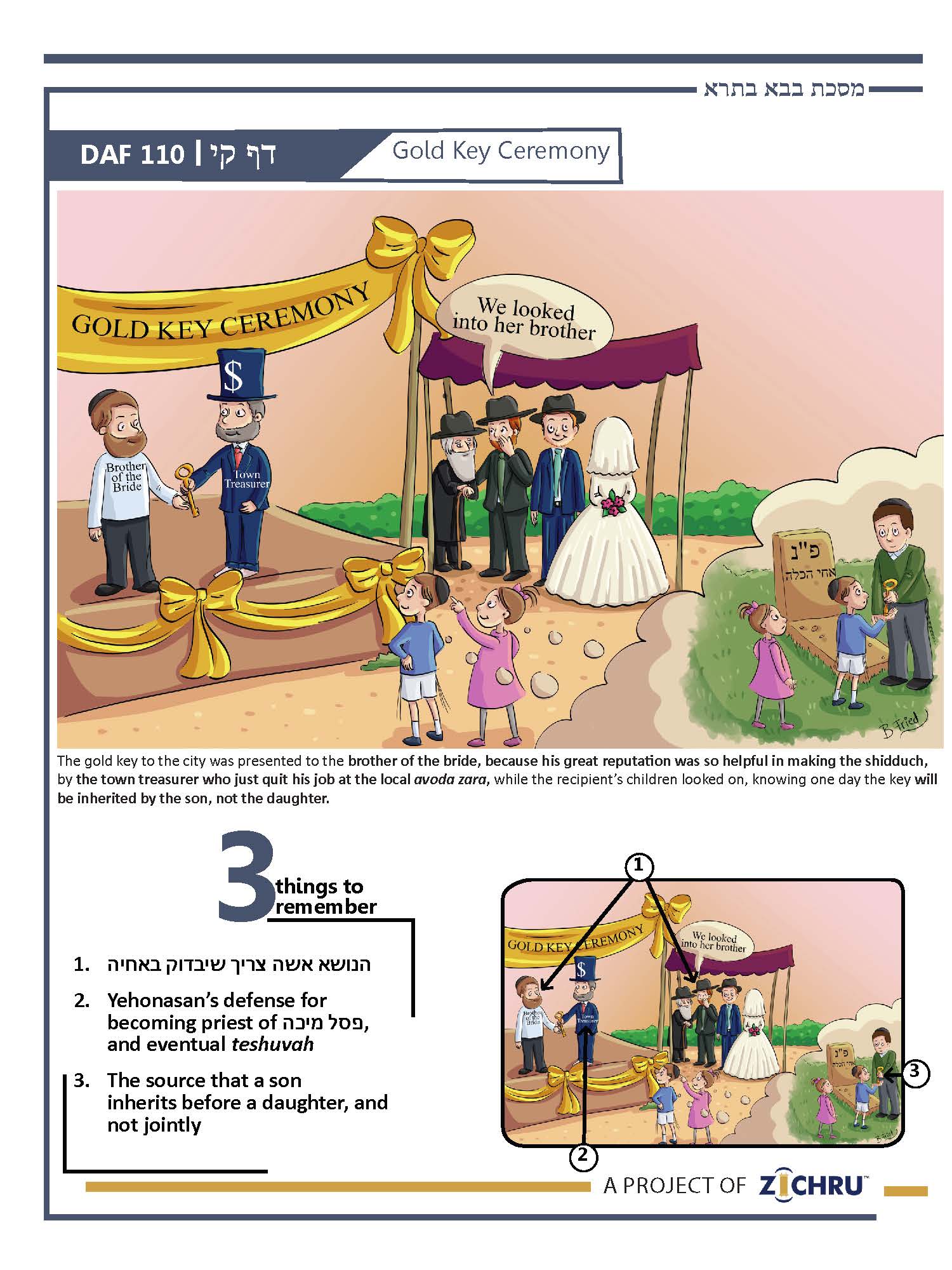Bava Basra - Daf 110
- Audio Timestamps
0:00 - The 3 Sugyos
2:43 - Review of 3 Sugyos
5:12- Siman
8:03 - 4 Blatt Back Chazarah
15:06 - Pop Quiz (Last 7 blatt)
- For access to all Zichru resources including PDFs, and illustrations CLICK HERE
- הנושא אשה צריך שיבדוק באחיה
Rava said: הנושא אשה צריך שיבדוק באחיה – one who marries a woman should first examine the character of her brothers. The passuk says that Aharon married Elisheva, the daughter of Aminadav, "אחות נחשון" – the sister of Nachshon, as a wife. Since she was identified as Aminadav’s daughter, איני יודע שאחות נחשון היא – do I not know that she is Nachshon’s sister? Its mention must be to teach that one who seeks to marry a woman should first check her brothers’ character. A Baraisa gives the reason: רוב בנים דומין לאחי האם – most sons resemble the mother’s brothers. Since his future sons will be similar to his wife’s brothers, he should investigate their character before marrying her.
- Yehonasan’s defense for becoming priest of פסל מיכה, and eventual teshuvah
The passuk relates that men of Dan challenged Yehonasan’s becoming the priest for פסל מיכה, using the words "הלום", "בזה", and "פה". This hints that they said to him: לאו ממשה קא אתית – Do you not descend from Moshe, who was spoken to with expressions including these three words? תעשה כהן לע"ז – You became a priest for idolatry? He responded that he had a tradition from his grandfather (Moshe): לעולם ישכיר אדם עצמו לע"ז – a person should hire himself out to idolatry, ואל יצטרך לבריות – and not require the financial assistance of people. He mistakenly thought this literally meant to service avodah zarah, but it actually meant עבודה שזרה לו – work which is strange to him, i.e., undignified. Similarly, Rav told Rav Kahana: נטוש נבילתא בשוקא ושקול אגרא – skin a carcass in the market and take pay, and do not say, “I am a great man, and it is demeaning for me.” The Gemara relates that when Dovid saw that money was dear to Yehonasan, he appointed him over the royal treasure houses, because a passuk says that "שבואל", son of Gershom, was appointed over the treasure houses. This name indicates ששב לקל בכל לב – that he returned to Hashem with all his heart.
- The source that a son inherits before a daughter, and not jointly
The Mishnah on Daf 108a states that “sonsuggested but father, implying that when there are sons, daughters do not inherit. This is derived from the passuk which says that if a man dies and “has no son,” his daughter inherits, teaching: טעמא דאין לו בן – the reason she inherits is because he has no son; הא יש לו בן בן קודם – but if he has a son, the son precedes the daughter. Rav Pappa asked that perhaps the passuk means that when there is no son, she inherits alone, but if there is, she inherits together with him. Abaye responded that since we know from elsewhere that a daughter can inherit, it is obvious that she inherits alone when there is no son. Rather, the passuk teaches that a son precedes a daughter.
Two more sources are suggested, but rejected. Finally, another source is found: והתנחלתם אותם לבניכם אחריכם – and you shall keep them as an inheritance for “your sons” after you, teaching: בניכם ולא בנותיכם – your sons inherit them, but not your daughters (when there are sons). Although the passuk "למען ירבו ימיכם וימי בניכם" – so that your days, and your sons’ days, are prolonged, certainly does not exclude daughters, ברכה שאני – a blessing is different, and obviously includes daughters.
Siman – Gold Key Ceremony
The gold key to the city was presented to the brother of the bride, because his great reputation was so helpful in making the shidduch, by the town treasurer who just quit his job at the local avoda zara, while the recipient’s children looked on, knowing one day the key will be inherited by the son, not the daughter.


